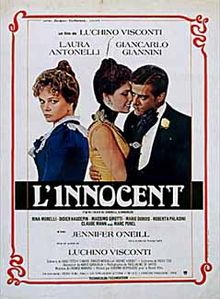
L'INNOCENTE
Italy, 1976, 125 minutes, Colour.
Jennifer O'Neill, Giancarlo Giannini, Laura Antonelli, Massimo Girotti.
Directed by Lucchino Visconti.
L'Innocente was the last film of celebrated Italian director Lucchino Visconti. Visconti had made many memorable films from the '40s including Obsession, The Damned, Death in Venice. This film is set in the period of his 1950s film, Senso and is reminiscent of it.
Set at the end of the 19th century, the film is operatic in style, sumptuous in its settings and decor. Villas around the city of Lucca were used to great effect. The screenplay is based on a novel by Gabriele D'Annunzio, who was considered to have given some legitimacy to the ideas and behaviour of Mussolini and the fascists. It is a picture of a decaying society - one that emerged from the upheavals of the 19th century but which still clung to the norms of the past.
Giancarlo Giannini is very good in the central role and is supported well by Laura Antonelli as his wife and Jennifer O'Neill as his mistress. There is a background of classical music and piano selections.
1. The work of Visconti, his being at home in the 19th century world? Italian background, the 19th century, sumptuous and beautiful, operatic? The work of D'Annunzio?
2. The use of wide screen pageantry, grandeur? The villas, the salons and parks? The visual compositions and tableaux? The modelling of paintings? The use of music?
3. The 19th century and Risorgimento and decay? Manners, appearances, morals?
4. The Italian man in this society, macho and superior attitudes? The irony of the screenplay? The role of women in society, wife, mistress grandmother? Changing roles of women - self-assertion?
5. The title and its focus, the child and its repercussions?
6. The portrait of Italian society: beautiful elegance, music and soirees, people's expectations of one another, opulence, villas? Literature? The military and careers? Wealth, duels? The status of family relationships?
7. Tullio: in himself, his presuppositions for behaviour, the nature of his marriage to Giuliana, the contract, its brittleness? His relationship with Teresa and the expectations on the mistress? The trappings of marriage? His philosophy of life, affection for his wife? Contracts and freedom? Consequent behaviour? The freer relationship with Teresa? Leaving his wife, the duel with his rival? His return to his family, going to his mother's villa, using Federico for contacts? The rediscovery of his relationship with Giuliana, sensual and sexual? The possibility of a new beginning? The pregnancy?, His anger with D'Arborio, watching him at the fencing? His sense of honour? Decisions, Teresa? His wife? Love, urging her to an abortion, her refusal the birth of the baby, his love for it and hatred of it, threatened by it? The ultimate clashes with his wife? Going to Teresa - her sense of freedom? His own sense of futility, his death?
8. Giuliana in herself, marrying Tullio, love, the formalities of the marriage, contract, her being hurt, her going to the soirees? Taking the pills, meeting the D'Arborio, the affair? Her pregnancy? The new love for her husband, his urging her to the abortion, the decision? The birth, coping, love for the child? Her final self-assertion?
9. Tullio's mother, the marriage, pride in her son, the hopes for the grandchild?
10. Federico and his story, the family, the military, with D'Arborio, helping Tullio?
11. D'Arborio, his place in society, writing, esteem, Tullio's dislike of his writing, fencing, going to Africa, his illness and death?
12. Teresa and her status in society, widow, countess, mistress? Free? The glittering life, relationships? With Egano, the races, the duel? The difficulties of the relationship with Tullio? His death? The final image of her walking away?
13. Themes of the roles of men and women, the qualities of men and women? Freedom?
14. 19th century Italy, Italian society, environment, shaping the 20th century? The film's judgment on this society?